5th November 1918 Tuesday
The Assistant Director Medical Services Drops In
All material produced or reproduced here and throughout this work is the sole copyright of the author and the family of Doctor D.C.M. Page MC.
“On the following day I had a surprise visit from the A.D.M.S. and Kennedy. They spent the day with me, and I showed them all the sights, including the Forestry Village. The A.D.M.S. did not approve of my idea of a hospital in the Forestry Village, as it was too far (1 mile) from the railway. He was disgusted with the sanitation of the place, and ticked off the camp commandant for not helping me to improve matters. The A.D.M.S. returned to Archangel at night, but Kennedy stayed on for a couple of days making notes of all the sanitary requirements.”
Colonel McDermott ADMS see 19th October entry
Captain Kennedy DADMS (Sanitation) attended Douglas’s old school George Watson’s College, Edinburgh.
Find out about our connection with Dr Page and an introduction to his diary here
4th November 1918 Monday
Enter Commandant Lucas
All material produced or reproduced here and throughout this work is the sole copyright of the author and the family of Doctor D.C.M. Page MC.
“On November 4thI had an interview with Col. Lucas, a French officer, who has command of the Force now. The same afternoon the Bolsheviks attacked us. They were seven hundred (700) strong, according to the American story, but were very easily repulsed. Our casualties were 1 man killed, and 2 wounded. The Bolos lost heavily. We took 10 prisoners and many were killed and wounded.”
The French Commandant Lucas was brought in by General Ironside on November 3rd to command the railway front following the refusal of the American Colonel Stewart to take on a combat role. This refusal had Ironside wondering how it was possible for any military man to refuse the chance of swapping an administrational command for that of a combative one. Lucas had no such hesitation and accepted immediately. He had much experience after lengthy commands in the French Colonial Service, choosing a Major Aarchen as his staff officer. He would convince his French troops that the Americans would not be able to fight without the French by their side, so boosting the fighting morale of his men.
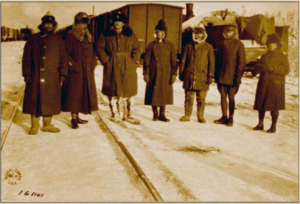
Lucas is second from the left (c) https://www.archives.gov/
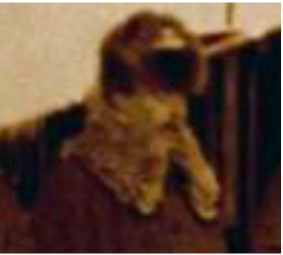
Find out about our connection with Dr Page and an introduction to his diary here
2nd November 1918 Saturday
Wily Monsters
All material produced or reproduced here and throughout this work is the sole copyright of the author and the family of Doctor D.C.M. Page MC.
“During the next day or two I was busy interviewing Colonels, Majors etc. and urging upon them the need for proper sanitation for the troops. It was a job getting them to make a move at all. On the 2ndNovember I ‘flitted’ into a room in the yellow house. The place had previously been occupied by American troops, and was crawling with bugs. I had the room sprayed with cresol, but this didn’t seem to have much effect on the wily monsters.”
Cresol was and is an organic compound that can be extracted from coal tar or can be produced synthetically. It was commonly found in creosote and is the source of the coal tarry smell associated with the now discredited creosote products for the damaging effects on health and the environment. The European Union has restricted its use and it is no longer available to preserve your wooden fences.
The list of side effects from inhaling, ingesting or applying high levels of cresols to the skin is warning enough not to go near them. These include skin burning and irritation, vomiting, damage to internal organs, facial paralysis, coma and even death. The long list of case reports on this website is scary reading too https://toxnet.nlm.nih.gov/cgi-bin/sis/search/a?dbs+hsdb:@term+@DOCNO+250
One might wonder what the longer term effects on the people exposed to the Cresol solution may have been. Sadly the bugs Douglas speaks about seemed impervious, at least in the short term, to it.
Find out about our connection with Dr Page and an introduction to his diary here
29th October 1918 Tuesday
Off to Archangel Again
All material produced or reproduced here and throughout this work is the sole copyright of the author and the family of Doctor D.C.M. Page MC.
“On Tuesday evening, 29th Oct., I travelled down the line in the Ambulance Train on my way to Archangel to see the A.D.M.S. on business. The train pulled up at Isako Gorka at some unearthly hour in the morning but I slept on till nearly 8 o’clock. I caught the 9 o’clock passenger train to Bakharitza, and at the station met Steuart who is M.O. at Isako Gorka. I think he said that he had about twenty soldiers to look after, and was having a grand time with dances nearly every night! When I eventually reached the A.D.M.S.’s office, I found him rather scared over a telegram which he had just received from H.Q. at home. He had the ‘wind-up’ properly! My conference with him was successful, as he gave me a free hand to do what I liked ‘up the line’! On the way back to Obozerskaya I dined with Steuart at Isako Gorka.”
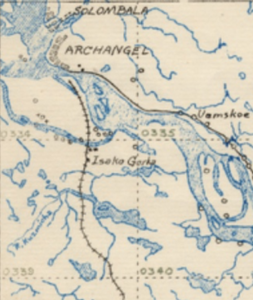
Map University of Michigan digital archive https://quod.lib.umich.edu
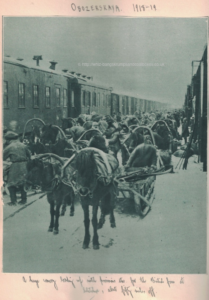
A huge convoy loading up with provisions etc for the British force at Seletskoe about fifty miles off
Find out about our connection with Dr Page and an introduction to his diary here
28th October 1918 Monday
Captain Page Rides the Footplate!
All material produced or reproduced here and throughout this work is the sole copyright of the author and the family of Doctor D.C.M. Page MC.
“On Monday 28th I had a trip up the line to the forward positions at Verst 455. I travelled on an engine – the usual way of getting about! It was very bumpy, and hot. The engine fire was stoked with huge billets of wood. The country we passed through was very bleak and uninteresting – forest and swamp. When I arrived at Verst 455 I found no M.O. there as I had expected, so returned by engine to Verst 466 where I met an American doctor, named Collins – a good sort. I remained with him quite a while, and returned to Obozerskaya by the evening train.
The Flying Corps mess at Obozerskaya was a great place. Like most of the other messes it was housed in a railway carriage. The walls were decorated with pictures distinctly Parisian, and the food served up was always wonderfully good, although it did not touch the efforts of the French chef at H.Q. Mess. The Officers were nearly all Canadians, and a right merry bunch they were too. Many a jolly evening I spent with them. In return for their kindness to me I was able to ‘wangle’ for them a gramophone, and numerous records from the Red Cross Stores!”
Find out about our connection with Dr Page and an introduction to his diary here
27th October 1918 Sunday
Douglas Spies a Hospital in the Woods
All material produced or reproduced here and throughout this work is the sole copyright of the author and the family of Doctor D.C.M. Page MC.
“On Sunday 27th I had a walk over to the ‘Forestry Village’ about a mile from Obozerskaya with the Sanitary Sergeant. This little settlement is a group of about half-a-dozen houses surrounding a large school-house. Here, in pre-war days, the Russian Government trained some of their many forest rangers. I found it to be a delightful little spot, and had a look through the school with a view to acquiring it as a hospital. To my mind it should make an ideal little hospital, with billets for the staff in the adjoining houses.”
Find out about our connection with Dr Page and an introduction to his diary here
26th October 1918 Saturday
Elusive Russian Elephants
All material produced or reproduced here and throughout this work is the sole copyright of the author and the family of Doctor D.C.M. Page MC.
“Everything now is covered with a thick mantle of snow, as it has been snowing hard without ceasing for the last few days. The winds are bitterly cold too. On the 26th Oct. I met Capt. Hughes, M.C. who is in charge of the Ambulance Train, and Lt. Commander Young, who commands the armoured train up here. He lost his right arm at Zeebrugge. Capt. Rosenfeldt went out into the forest in the afternoon on a shooting expedition, but didn’t bag anything. He brought back, however, great tales of all the bears, wolves, elephants etc. that he had encountered!”
Find out about our connection with Dr Page and an introduction to his diary here
25th October 1918 Friday
Resemblance to an Executed Diplomat
All material produced or reproduced here and throughout this work is the sole copyright of the author and the family of Doctor D.C.M. Page MC.
“On Friday 25th Oct. I met the Camp Commandant, Major Turner, and had a long talk with him about the sanitation of the place etc. He was nick-named – Major Casement – being not unlike that worthy! He was a very heavy drinker, and was in many an escapade whilst I was on the Railway Front. The sanitation of this part of the front I found to be hopeless. There were no proper latrines, and no facilities for the men washing.”
The mention of Major Casement is a clear reference to Roger Casement executed in 1916 for his part in the Easter Uprising in Ireland. We can assume Major Turner bore more than a passing resemblance to the former British diplomat.
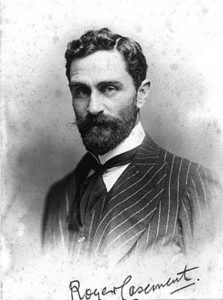
NLI Ref.: CAS1A https://www.flickr.com/photos/nlireland/6188264610/
Find out about our connection with Dr Page and an introduction to his diary here
24th October 1918 Thursday
The Objectional Little Worm and Annoying Woodlice
All material produced or reproduced here and throughout this work is the sole copyright of the author and the family of Doctor D.C.M. Page MC.
“On Tuesday 24th October I left Bakharitza by train at 9.30 a.m., and travelled quite comfortable in a 2nd Class carriage with a man Phillips, one of the Relief Food Commissioners, who was very interesting. Reached Obozerskaya about 3 p.m. which is considered good going for this line! The country we passed through was bleak and uninteresting – nothing but swamps and forests. I reported to the O.C. at H.Q., who turned out to be Col. Gavin, late of D. Force, my old boss. He was delighted to see me. I had a job finding a billet for the night, but eventually put up in an old truck used as part of the ambulance train. Most of the troops up here live in railway trucks. What a life! I met Capt. Black, our surgeon up here – a thin, hatchet-faced individual, an atheist and a pro-German. Later on I found out that he was the cause of all the trouble that had been going on up here, and that he was a most objectionable little worm. I also met Capt. Rosenfeldt, an American doctor, who is in charge of the hospital in the station house here. Rosenfeldt is an Austrian, and looks it, and he and Black turned out to be very friendly. Many a time they annoyed me with their Pro-Hunnish talk.
The hospital here consisted of two wards, and I never saw such a dirty place in all my life before. It was staffed by American orderlies, as well as two Russian nurses – awful looking hags. I noticed later that Black was paying a lot of attention to one of them, and used to have her into his operating car to tea! There was also a Russian doctor attached to the hospital. He did not do any work, however, but played a lot of draughts and chess with Black. At midnight I was present at an operation for acute appendicitis which Black did in his operating car. I gave the anaesthetic, and all went well. The operating car was a railway carriage converted into an operating theatre and was a beautiful little place. Black and his orderly had bunks in the same carriage, and another carriage served as a ward. I found it very cold in my new abode – the railway carriage – and wood lice annoyed me all night.”
Find out about our connection with Dr Page and an introduction to his diary here
22nd October 1918 Tuesday
Episode Two of Douglas’s Russian Experience and the Death of Lt. Kenneth Croal
All material produced or reproduced here and throughout this work is the sole copyright of the author and the family of Doctor D.C.M. Page MC.
“I set off on Tuesday 22nd October on the second part of my Russian adventure. I crossed by boat at one o’clock to Bakharitza on the other side of the Dwina, and proceeded to 82 Casualty Clearing Station where I put up for the night. All the next day I was busy buying stores – candles soap etc. – from the canteen. I heard that Kenneth Croall had been killed in the Railway Front. The news came as a great shock to me, as I was looking forward to seeing him again.”
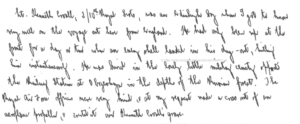
“Lt. Kenneth Croall(sic.), 2/10th Royal Scots, was an Edinburgh boy whom I got to know very well on the voyage out here from England. He had only been up at the
front for a day on tour when an enemy shell landed in his dug-out, killing him instantaneously. He was buried in the lovely little military cemetery opposite the railway station at Oberzaskaya in the depths of the Russian forest. The
Royal Air Force officers were very kind & at my request made a cross made of an aeroplane propeller & erected it over Kenneth Croall’s grave”.
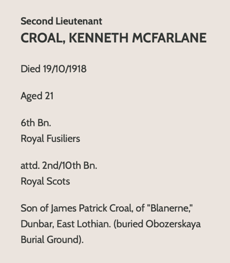
Kenneth Croal is mentioned by General Ironside in his account of the Russian Intervention, Archangel 1918-19 and now has a memorial in the Archangel Allied Cemetery in Archangelsk, North Russia.

Although Douglas intimates that he met 2nd Lt. Kenneth Croal on the City of Cairo bringing them both to Archangel, Kenneth was in fact well known to friends of the Page family the Sturrocks of Leith. When I first read the mention of Lt. K Croal in General Edmund Ironside’s “Archangel 1918-1919”, I knew that it was a name familiar to me. Searching through family photographs we came across the picture that I knew we had. Fortunately, a contemporary relative had marked the backing paper of the picture identifying those in the group. The group consisted of Kenneth Croal then aged about 18; T.G.Gordon Sturrock (see this diary post for more details) Mrs. Annie Sturrock (Gordon and Douglas Sturrock’s Mother) and Douglas Sturrock.
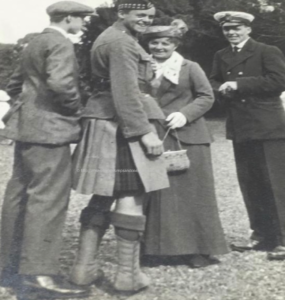
At a garden fete at Sir Richard Mackie’s (Provost of Leith) at Trinity. Kenneth Croal (killed in action), Gordon Sturrock (killed in action), Mrs Sturrock and Douglas Sturrock.
Find out about our connection with Dr Page and an introduction to his diary here